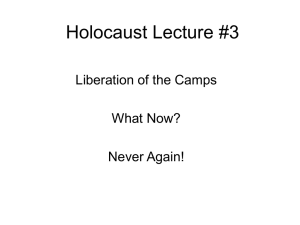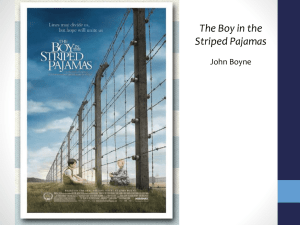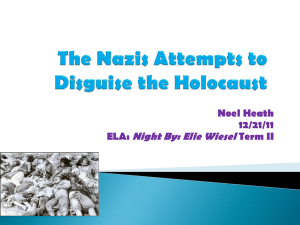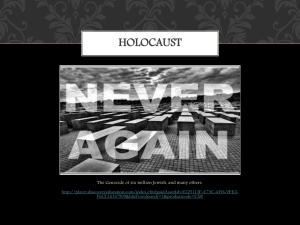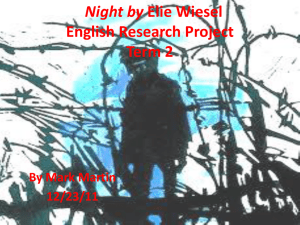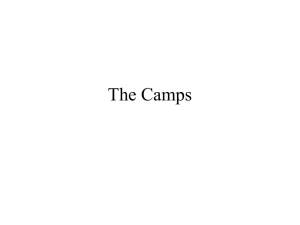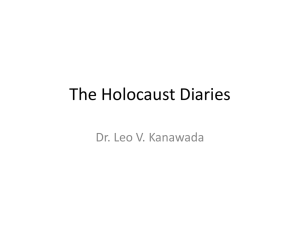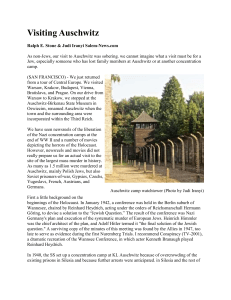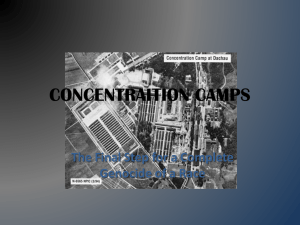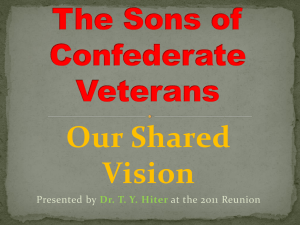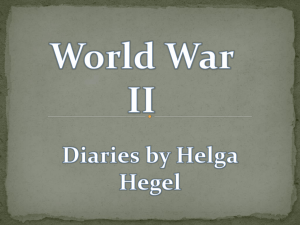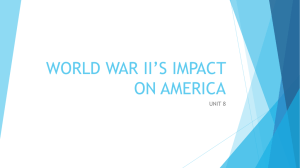LIBERATION OF CONCENTRATION CAMPS Brittany Harris
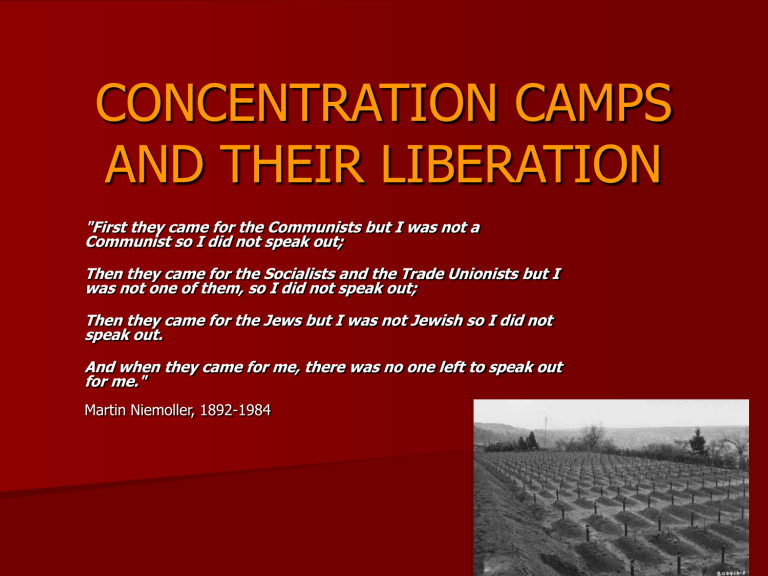
CONCENTRATION CAMPS
AND THEIR LIBERATION
"First they came for the Communists but I was not a
Communist so I did not speak out;
Then they came for the Socialists and the Trade Unionists but I was not one of them, so I did not speak out;
Then they came for the Jews but I was not Jewish so I did not speak out.
And when they came for me, there was no one left to speak out for me."
Martin Niemoller, 1892-1984
ANTI SEMITISM
• Was created in 1879
• First used by Wilhelm Marr
• German agitator to explain the current anti-Jewish campaigns in Europe
• The hostility or prejudice against the Jewish race and ethnic group
• Extremism in Germany made by Hitler leads to . . .
THE FINAL SOLUTION
Plan to exterminate all of Jewish people
Implemented in stages
Nazis and Hitler rose to power
State-enforced racism in Jewish legislation
Boycotts
“Night of Broken Glass”
All leading to isolation of Jews
1939 CAMPS
Auschwitz
Dachau
Majdanek
Buchenwald
Belsen
CAMPS
Poland (Monowitz,
Birkenau)
Munich, Germany
Lublin, Poland
Weimar, Germany
Celle, Germany
DACHAU
First camp to be created
March 1933
Empty munitions factory
10 miles west of Munic, Germany
CAMP STRUCTURE
Auschwitz
– Largest camp established
– Broken down three camps
Auschwitz I:
– Concentration camp
Auschwitz II:
– Birkenau Killing Center
Auschwitz III:
– Monowitz Forced Labor camp
– 1.1 million Jews eliminated
– Other victums
Christian Poles
Roma Gypsies
Soviet Prisoners of war
DEPORTATIONS
ENTERING CAMPS
Brought from cities on box car trains
OPTION 1
Taken off trains
And separated
Fit and healthy able
To work in camp
Shaved heads and stripped
Naked given alternative clothing
OPTION 2
Healthy and used for
Medical experiments
OPTION 3
Most unable to work
Taken straight to gas chambers
HOW?
GAS CHAMBERS
Gas vans
Gas used:
Carbon Monoxide
Zyklon B
Tested on Gypsy children
Delousing to control Typhus
September 3, 1941 first killing 600 Soviet POW’s
Most deaths from Gas
CREMETORIUMS
►
Put in all camps
►
Auschwitz camp
Estimated killing capacity up to 340 every 24 hours
►
Normally dead first
MEDICAL EXPIRAMENTS
Three main groups
1) Tests aimed at easing survival of military personnel
2) Testing pharmaceuticals treating military and occupation personnel.
3) Advancing racial ideological tenets of Nazi worldview
Other testing
Sterilization experiments in Auschwitz and
Ravensbrueck on “unfit” races
ALL INVOLVED
Hitler – creator of “Final Solution”
Dr. Josef Mengele – experimented on prisoners
Many SS officers – killed and controlled
Jewish and other prisoners
U.S. troops – liberated camps
Soviet troops – liberated camps
NEWS OF LIBERATION
• News of the U.S. and Soviet troops moving forward set off alarm for Germans
• Began Death marches
• Destroyed crematories and gas chambers
• Prisoner riots began
DEATH MARCH
1944-1945 Largest took place
Nine days before reaching Auschwitz 60,000 marched toward Wodzislaw then put onto trains
One march consisted of 6,000 women 1,000 men
600 died
The remainder were forced into the ocean and shot
PUSHED FORWARD
FINAL LIBERATION
• Camps liberated by Soviet Union:
– Majdanek – July 1944
– Belzec, Sobiber, Treblinka – summer of 1944
– Auschwitz – January 1945
– Stutthof
– Sachsenhausen
– Ravensbrueck
LIBERATION cont’d
• Liberated by U.S.:
– Dachau – April 1945
– Buchenwald – April 11, 1945
– Dora-Mittelbau – April 1945
– Mauthausen – May 1945
– Flossenbuerg
AFTER LIBERATION
• No homes to go to
• Many died weeks after liberation from malnutrition
• Many had louse-borne Typhus fever and had to be treated
• Treated with doxycycline 200 for 24 hours
• Never could fully return to their lives before
ESTIMATED NUMBER OF NON-
COMBAT DEATHS
Ukrainians
Jews (all countries)
Russian POW’s
Russian civilians
Poles
Gypsies
Disabled
Homosexuals
5.5-7 million
6 million +
3.3 million +
2 million +
3 million +
200 – 500 thousand
70 – 250 thousand tens of thousands
CREDITS
Page 1 – picture……………google images
Page 2 – cartoon…………...google images
Page 3 – picture………………..google images
Page 4 – map………….............holocaust museum
Page 5 – map…………………..holocaust museum
Page 7 – picture(1,2)………….google images
Page 8 – map………................holocaust-history.org
Page 9 – picture (1,2)……........google images
Page 10 – map………..............holocaust museum
Page 11 – map………………….holocaust museum
Page 13-17 – pictures …………google images
Page 22 – map………………….holocaust museum
Page 24 – picture……………….google images
Page 25 – map………………….holocaust museum
